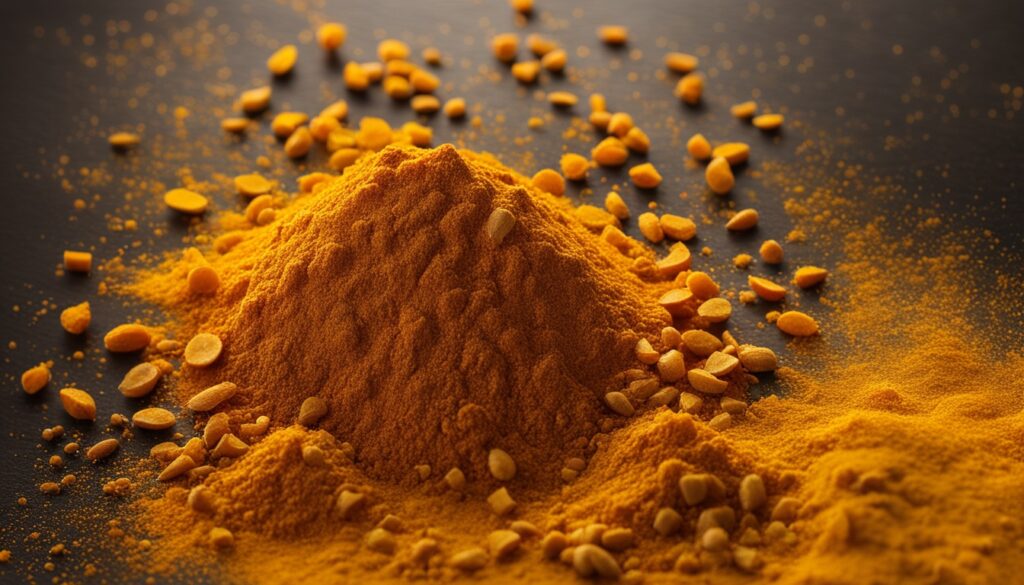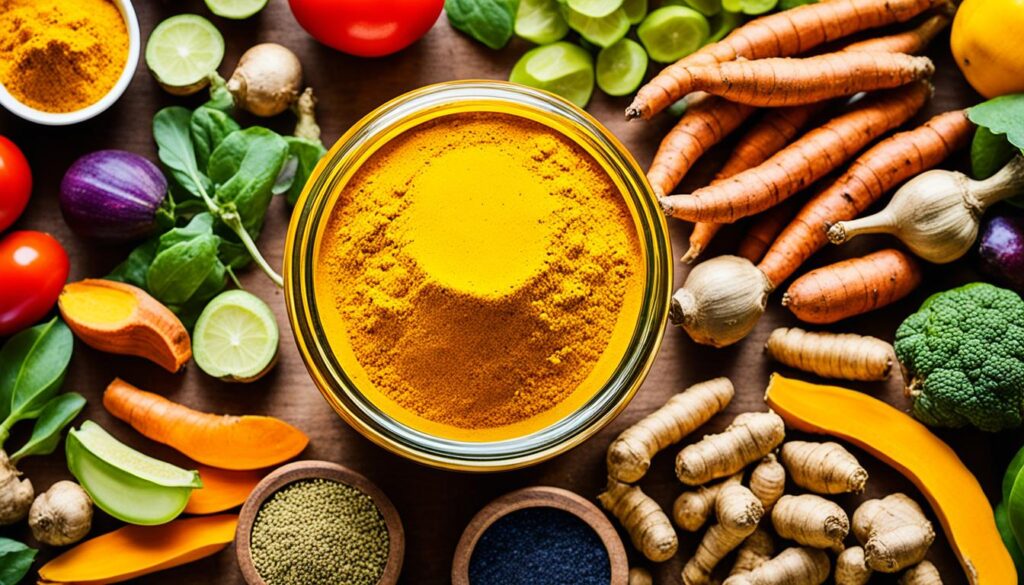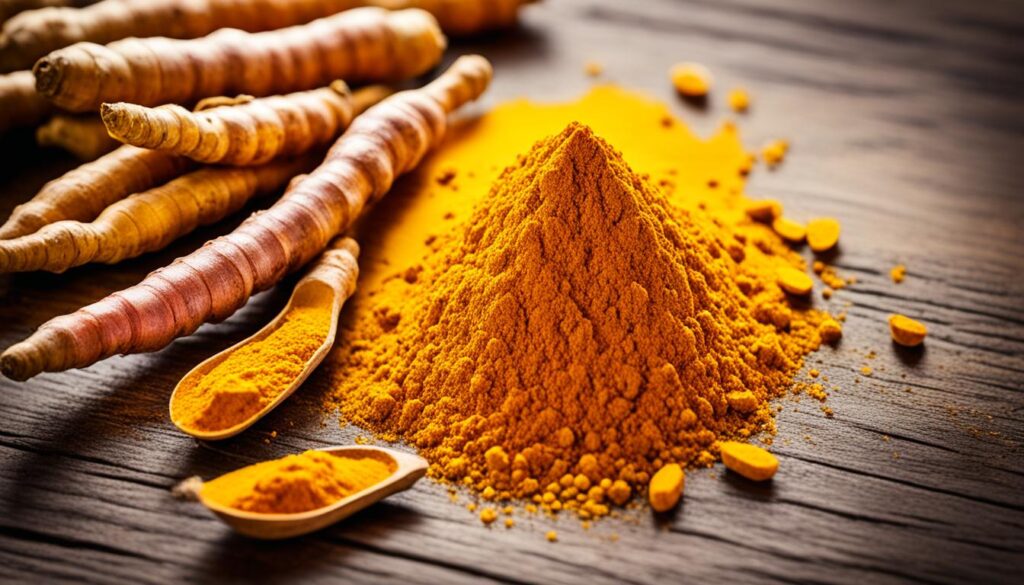Ever thought about why a spice used for 5,000 years is a superfood now? That’s the story with turmeric.
Turmeric is a key part of Indonesian culture. It’s known worldwide for its health benefits. This spice is bright yellow and is found in Chinese and Indian traditional medicine. Its main component, curcumin, is rich in anti-inflammatory and antioxidant properties.
This makes turmeric great for easing stomach issues, improving heart health, and maybe even helping with Alzheimer’s. Recent research also shows it might help in cancer treatment by stopping tumour growth.
Black pepper makes the most of curcumin by helping our bodies absorb it better. Whether you add turmeric to food or take it as a supplement, it’s great for dealing with pain and cleaning the liver.

Key Takeaways
- Turmeric has been utilised in Indonesian culture for over 5,000 years for its medicinal properties.
- Curcumin, turmeric’s active component, is a potent anti-inflammatory and antioxidant.
- Turmeric’s health benefits include digestive support, heart health, and potential Alzheimer’s therapy.
- Studies indicate turmeric’s role in cancer therapy by aiding cell death and inhibiting tumour growth.
- Black pepper enhances the absorption of curcumin, maximising its effectiveness.
- Turmeric can be easily incorporated into culinary dishes or taken as a supplement.
Introduction to Turmeric
Turmeric is known for its bright yellow colour. It’s a key ingredient in curries and is loved for its taste and health benefits. The magic behind turmeric comes from curcuminoids, with curcumin as the star. Curcumin has powerful anti-inflammatory and antioxidant effects, even though it’s a small part of turmeric.
Turmeric faces a challenge called low bioavailability. However, this problem can be solved. When turmeric is taken with black pepper, which has piperine, curcumin gets absorbed better. This team-up increases curcumin’s effectiveness by 2,000%. Turmeric is useful in cooking and as a medicine. This shows how versatile it is and why it’s valued for health benefits.
The Medicinal Compounds in Turmeric
Turmeric is famous for its health benefits due to its bioactive compounds. Among these, curcumin shines for its great effect on health.

Curcumin: The Active Ingredient
Curcumin is the key part of turmeric, even though it’s just a small bit of the spice. It stands out for reducing inflammation and fighting off harmful molecules. These make it super important in health research.
To really benefit, you need a lot of curcumin. It’s best used with piperine to boost how much your body can use. This way, it gets absorbed better.
Other Beneficial Compounds
Besides curcumin, turmeric has more bioactive compounds that add to its health value. They all work together to reduce inflammation and fight off oxidants. By using turmeric extracts that have things like piperine or fatty acids, you get more health perks. This ensures you get the most from this spice.
Pain Relief Benefits of Turmeric
Turmeric is known for easing pain because it fights inflammation naturally. It offers a safer way to deal with pain, especially from joint and muscle issues. Studies have shown it works better than fake pills and as well as some anti-inflammatory drugs for arthritis.
This spice is more than a flavour. Turmeric is a natural painkiller you can add to your meals. This means it’s a cheap and easy way to help with pain without turning to fake chemicals. Using turmeric often can really help with long-lasting pain, showing it’s a big deal in the world of natural pain relief.
If you use turmeric regularly in your food, you’re not just enjoying meals. You’re also making the most of its healing powers. This can make a big difference in how you feel every day.

Turmeric’s Anti-Inflammatory Properties
Turmeric is famous for its many health benefits. It gets these from a substance called curcumin. Curcumin helps a lot with both short-term inflammation, like after an injury, and long-term, like in diseases. So, turmeric is great for both fixing time-to-time bugs and keeping you well.
Reducing Acute Inflammation
Curcumin in turmeric shines at tackling short-term inflammation. This helps a lot when you’re hurt or sick. Quick doses of turmeric in your dishes can make recovery smoother. It’s like a helpful hand, easing the hurt while you heal.
Managing Chronic Inflammation
For longer, sneaky inflammation turmeric is there too. Think, conditions slow to show like arthritis and heart disease. Having turmeric often can soften these blows. It keeps your health firewall strong against such problems.
Liver Health and Detoxification
Turmeric is praised for helping the liver stay healthy. Its key part, curcumin, boosts the liver’s clean-up work. This can help lower cholesterol and keep the liver in good shape.
Curcumin also protects liver cells from harm. This shield is crucial against toxins from the air and our food. Research shows it might slow down liver damage in serious conditions like cirrhosis.
Adding turmeric to your meals can really help your liver. It boosts the liver’s clean-up job and may keep it healthy for longer.
Boosting Antioxidant Capacity
Oxidative stress speeds up ageing and can lead to diseases. Turmeric can help by increasing antioxidants in the body. This effect is mainly due to curcumin. It’s a strong compound in turmeric that fights off harmful molecules and boosts the body’s defences.

Adding curcumin antioxidants to your daily diet can improve antioxidant capacity. This helps protect cells from damage. So, curcumin plays a vital role in living a longer, healthier life.
Turmeric in Modern Nutrition
In today’s world, turmeric is a hit for its many health perks and how it fits into various dishes. Its yellow hue brightens plates, playing a major role in our diets. Turmeric is a must-have, bringing both taste and nutrients to the table. Let’s explore ways to include it in what you eat every day:
Adding turmeric to your meals can be both easy and fun. You can sprinkle it in anything, from drinks to dinners, to boost both taste and health. Mixing turmeric into your food unlocks its many benefits. This cements its place as a modern nutritional superfood.
Incorporating Turmeric into Your Diet
It’s simple to start using turmeric in your meals. You can put a bit in your smoothie or use it to spice up stews. By doing this, you get its health perks in a tasty way. Turmeric is a key player for making your cooking not just good but good for you.

Popular Recipes Featuring Turmeric
There are many ways to cook with turmeric. Think golden lattes, colourful curries, or fresh salads. Golden lattes are a warm beverage that starts your day with joy. Turmeric-infused curries are tasty and full of health. And, turmeric dressing can make any salad a hit, bringing flavour and well-being to the table.
Scientific Studies Supporting Turmeric Benefits

Scientific studies are increasingly proving the health benefits of turmeric research highlights its power to prevent and help with serious diseases like cancer, heart issues, and Alzheimer’s.
Research on curcumin, the main active part in turmeric, shows its strong use in medicine. The curcumin scientific evidence proves it fights inflammation and acts as an antioxidant. This helps with healing. The studies also find that curcumin can stop tumours from growing and even kill cancer cells.
Turmeric’s health benefits are also good for the heart. Tests show that curcumin makes the heart’s blood vessels work better. This could lower the chance of heart sickness. And, turmeric research suggests it might help with brain problems too. Curcumin can get into the brain and fight off harmful cells. That might be key in treating Alzheimer’s, thanks to its anti-inflammatory and antioxidant features.
There’s more and more curcumin scientific evidence supporting what turmeric can do. This not only backs the old beliefs but opens new ways for doctors to use it. Mixing what we know from history with today’s science, these findings show how important turmeric is for good health.
Safety and Dosage of Turmeric
Using turmeric safely with its health benefits means sticking to the right dose. Studies show taking up to 12 grams daily is fine for most. But, taking too much curcumin needs care and might need a doctor’s advice.
If you’re already dealing with health issues or taking certain meds, talk to a doctor before adding turmeric to your diet. Figuring out the best curcumin dose helps prevent side effects and boosts turmeric’s good effects.
Adding turmeric to your diet can be really good for you. But, watching how much you take is important to avoid any issues. It helps everyone safely get the good from turmeric.
Conclusion
Turmeric is now known as an ancient superfood for easing pain and keeping livers healthy. It has been used for healing for thousands of years in different cultures. The key compound in turmeric, curcumin, is famous for its healing powers. It helps fight inflammation, works as an antioxidant, and supports the liver in detoxing.
Adding turmeric to your diet is more than just about flavour; it can significantly improve your health. It’s great for reducing pain, swelling, and increasing antioxidants in your body. To get the most out of turmeric, mix it with black pepper or have it with high-fat foods. This way, curmumin’s benefits are better absorbed by your body.
The health perks of turmeric show why it is so important in today’s wellness world. It’s useful for both treating health issues and preventing them. As we learn more, turmeric’s role in our diets will only grow. It’s clear that turmeric is here to stay, making our diets and bodies better.

